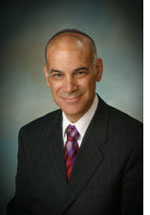By Rabbi Leonard Rosenthal

SAN DIEGO — There is a story that I have told many times based on a verse in parashat B’har: “But the land must not be sold beyond reclaim, for the land is Mine; you are but strangers resident with me.”
This verse teaches us that humans do not own the land. We are allowed to use it and live off of it, but we must not abuse it. Our world belongs to God, we are only its caretakers.
Here is the story I tell, as published in “A Garden of Choice Fruit,” by Keepers of the Earth, edited by Rabbi David E. Stein:
Two people were once fighting over a piece of land.
Each claimed ownership, and each bolstered the claim with apparent proof. After arguing for a long time, they agreed to resolve their conflict by putting the case before a rabbi.
The rabbi sat as an arbitrator and listened carefully, but despite years of legal training, the rabbi could not reach a decision. Both parties seemed to be right.
Finally, the rabbi said, “Since I cannot decide to whom this land belongs, let’s ask the land.”
The rabbi put an ear to the ground, and after a moment stood up.
“My friends, the land says it belongs to neither of you – but that you belong to it.” (Author Unknown)
This is a beautiful story. It teaches that the earth is not obligated to us, rather, we are obligated to the earth. What it requires, we must do.
This week I came upon another version of the same story that has a different ending with a different moral. This version has an author, Rabbi Yerucham Leibovitz of Mir, and the rabbi is not anonymous, it is Rabbi Chaim of Vloshin:
Two landowners were arguing over a disputed portion of land and could not reach a settlement. They came to Rabbi Chaim who did not adjudicate their claims, but rather bent over and put his ear to the ground. He listened carefully and then stood up to address the landowners. ‘You each claim to own the same piece of land, so I thought that I would hear what the land had to say about it.
“‘The land told me that your arguments have no merit, because one day each of you will belong to it.'”
This version teaches a very different lesson than the first. Rabbi Chaim is not making an ecological statement, but rather an existential one. He points out that there is a certain futility arguing about land or any other material possession, because no matter how much we own or have achieved, ultimately we will return to the earth from which we came.
Knowing that we have no assurance about the number of years we will live, instead of worrying about acquiring wealth or power, we should instead concentrate on those endeavors which bring joy, significance, and meaning to life.
Which story is the “correct one?” Both. In the words of the Talmud, “These and these are the words of the living God.” We need to take care of the world not only for ourselves, but for future generations, and we must do our utmost to live every day as if it was our last.
*
Rabbi Rosenthal is spiritual leader of Tifereth Israel Synagogue in San Diego. He may be contacted at leonard.rosenthal@sdjewishworld.com